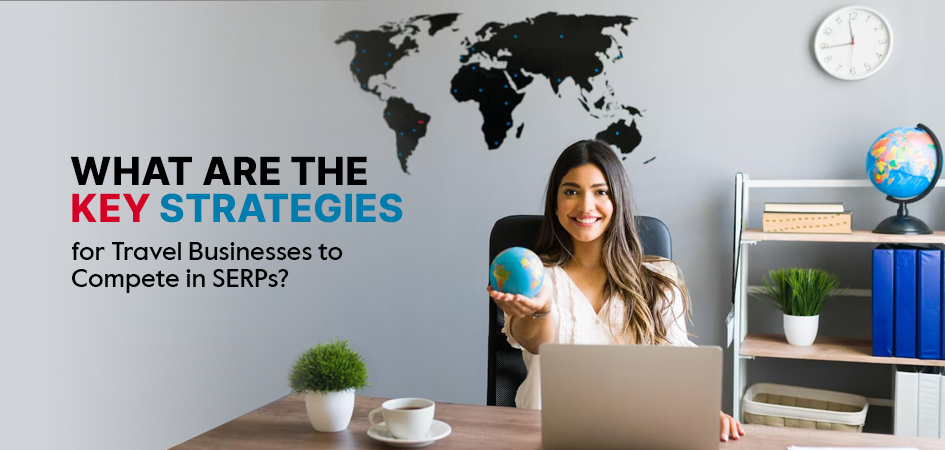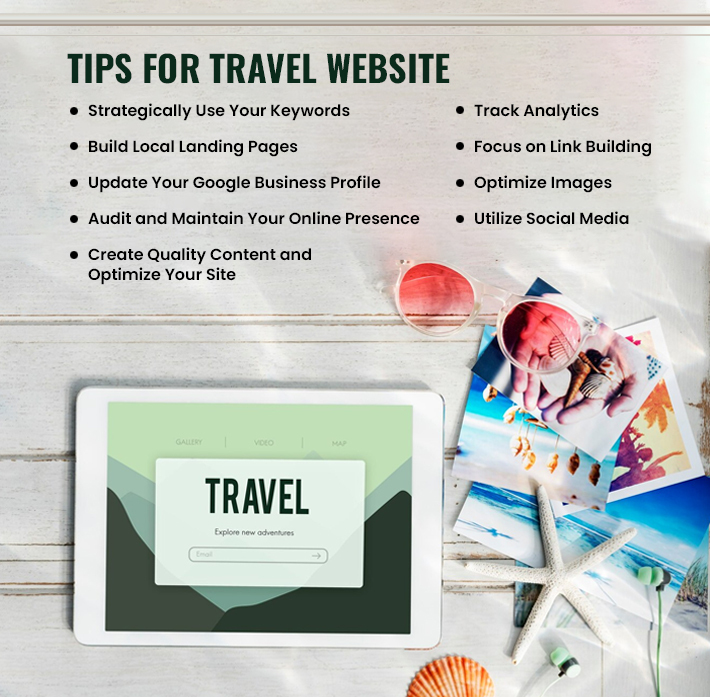
Are you struggling to boost your travel website traffic? You have been covered! Today’s customers are far more knowledgeable and smart. They conducted a lot of research before deciding on the best vacation.
Create Quality Content and Optimize Your Site
However, the question is, if your travel website is showing up the right results. Creating a travel website isn’t enough to drive results. You have to incorporate SEO and the right travel SEO strategies in the SERPs to reach your desired goal. This blog will cover some of the best SEO strategies for staying ahead of the competition in SERPs.
Importance of SEO for the Travel Industry
You may have the best website, but your clients must find you on the SERPs to access what you offer.
- Organic SEO is far more economical than paid Ads.
- SEO for your travel website can result in more leads.
- SEO may attract targeted and potential visitors to your website.
- SEO for your travel website will increase its exposure.
- Achieving strong rankings will result in consistent traffic flow to your website.
Now you know the importance of SEO for travel industry, let’s look at some of the best strategies for your travel website.

Want to dominate travel SERPs?
9 Must-Know Tips for Your Travel Website
Like typical SEO, Travel SEO involves keyword research, backlinking, content optimization and Local SEO . However, there’s more for the travel sector to focus on. For instance, customers usually search with broad and specific terms “London to Paris”.
Now, let’s dig deeper into SEO tactics for improving your website’s performance.
1. Strategically Use Your Keywords
An effective keyword list is crucial for better SEO performance. So, begin by making a list of words that describe your business. You can leverage Ubersuggest and long-tail keywords.
Consider paying attention to location-specific keywords like ‘Goa beach resort’ or ‘London tour guide’. Add these keywords to blog posts, meta descriptions, social media, URLs, and online profiles. Use keywords strategically to align with seasonal demands, user intent, as well as customer journey stages.
2. Build Local Landing Pages
Local landing pages are targeted for each city or region you serve. They help provide specific information about your services in those areas. These pages help attract local customers and improve search engine rankings by targeting location-specific keywords.
This approach increases visibility and makes it easier for potential customers to find and choose your business for their next vacation.
3. Update Your Google Business Profile
Your Google Business Profile (GBP) is an important aspect of your internet presence and is completely free to use. Personalize your profile with new photographs, offers, and messages to attract potential consumers. As more travelers use search engines to plan their trips, this will help you optimize your GBP demands through continual effort.
4. Audit and Maintain Your Online Presence
Competitive SEO demands regular website and content auditing. Focus on on-page SEO (keywords in titles, meta tags, meta descriptions, etc), off-page SEO (backlinks, guest posts, social media shares), technical SEO (crawling, indexing), as well as local SEO (optimizing GBP, local keywords).
Canonical tags, page speed, meta descriptions, mobile friendliness, keyword-filled H1 tags, no thin or duplicate content, and making sure backlinks are of high quality are some of the important audit areas.
Additionally, maintain a positive online reputation to boost travel SEO. Positive reviews enhance your authority and attract backlinks. Use platforms like Facebook, and monitor reviews regularly. Respond to feedback to build consumer confidence and improve SEO.
5. Create Quality Content and Optimize Your Site
Eight out of ten marketers prioritize content creation, and for good reason. Consistently producing quality content:
-
-
- Increases opportunities to rank in SERPs through keyword integration.
- Establishes and maintains authority.
- Attracts backlinks.
- Builds trust.
-
For travel SEO, blogging is key, but also consider social media, case studies, video content, and images. User-generated content (UGC) is particularly valuable; reviews and customer-shared images and thoughts catch Google’s attention and attract potential buyers. Consider launching competitions inviting past customers to share photos or videos that offer prizes or discounts.
SEO and profile updates are not one-time tasks; regular auditing and optimization are essential. This ongoing process helps improve user experience and adapt to evolving search engine algorithms.
Reviewing analytics data to understand visitor interactions will help you identify improvements that can boost engagement, SEO rankings, as well as conversions.
6. Track Analytics
Tracking analytics helps identify areas for improvement and develop strategies to reach potential customers better. Use tools like Google Analytics to monitor:
-
-
- Engagement rates.
- Traffic rates.
- Urchin Traffic Modules (UTMs) to track visitor sources and interactions.
-
Additionally, tracks unique page views, referral sources, average time on pages, and visitor geographic locations. This data provides insights into user interactions. This aids in refining marketing strategies and creating targeted campaigns.
7. Focus on Link Building
Focusing on link building in 2024 is crucial for travel SEO. Backlinks from authoritative sites can boost your search engine rankings, increase visibility, and establish relevance. Effective link-building strategies include:
-
-
- Issuing press releases about special offers and contests.
- Arranging interviews with magazines and podcasters.
- Creating ‘ultimate guide’ style posts.
- Developing image-rich content for sharing on social media.
- Releasing eBooks with travel tips and guides.
- Writing guest posts.
-
8. Optimize Images
Properly optimizing images enhances your website’s search result rankings. Here are some tips to maximize the impact of your images:
-
-
- Ensure images are SEO-friendly by including appropriate alt tags and alt text with relevant keywords.
- Use high-quality images and remove distracting elements like watermarks or low-resolution issues.
- Create an image sitemap to provide search engines with more information and improve site crawling.
- Compress images to boost page speed.
- Implement responsive design to have users on different devices.
-
9. Utilize Social Media
Social media is a platform to connect with potential customers and enhance brand loyalty. It increases page engagement, provides backlinks, and boosts brand presence.
Travel companies, especially on platforms like Facebook, capitalize on social media to promote their businesses. Creating content around local attractions and events drives engagement. Booking.com, for instance:
-
- Utilizes storytelling through articles and helpful tips shared on social media.
- Share videos on YouTube.
- Consistently posts diverse content across various social media platforms.
- Publishes geographical content tailored to users’ preferences.
- Makes effective use of hashtags and creates shareable memes.
Conclusion
Optimizing your travel blog or site for SEO doesn’t have to be daunting. By following the above tips, you can start seeing results over time. A well-executed SEO strategy enables you to attract new business and retain loyal customers with less effort. With the right strategies in place, your website can outshine competitors on search engine results pages (SERPs). For further assistance, contact our expert team at WillShall.

I bring a wealth of knowledge and experience to WillShall Consulting with two decades of expertise in Website Design, Development, and Digital Marketing, My journey has been marked by a passion for creating innovative web solutions that not only meet but exceed client expectations. As an avid analyst, I dedicate myself to understanding each customer’s unique needs, ensuring that our web solutions are not just functional but exceptional.






 Call Us
Call Us Email Us
Email Us Video Call
Video Call



